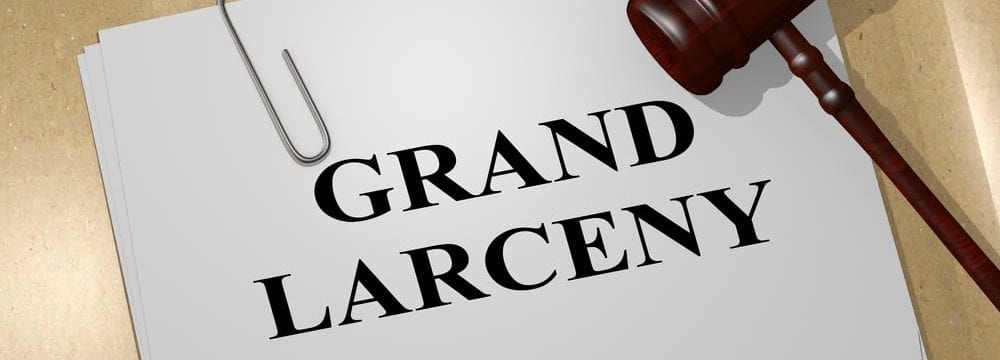
Larceny is defined as the “unlawful taking and carrying away of the property of another person, with the intent to permanently deprive them of its use.” A larceny verdict typically arises after prosecutors prove the obvious intent of the thief to take the possession or item.
Larceny differs from robbery because while robbery uses force or threat to take possession, larceny does not. Larceny is committed when someone takes an item of any value. Grand larceny is committed when a person takes possession of an item of significant value. Though the differences between the two are small, the charges vary between the two.
Most people have committed larceny at some point in their life and may have not realized they were committing a crime. For example, if an employee takes an inexpensive item from their workplace for their own use, they have committed larceny.
If you are facing larceny charges, you should seek legal representation from a trusted theft attorney immediately. Our Orlando larceny lawyers have experience dealing with numerous larceny cases and is eager to help fight with you for the most favorable outcome.
Petit theft, sometimes called “petty theft” is a misdemeanor offense for larceny of goods valued at less than $750. In Florida, the penalties are broken down into two classifications. Property valued at less than $100 is a second-degree misdemeanor while property valued at more than $100 and less than $750 is a first-degree misdemeanor. Punishment is based on the number of prior offenses as seen below:
Regardless of how many charges you have against you, you can presume that prosecutors will attempt to punish you to the greatest extent possible. A dedicated criminal defense lawyer can help you build a solid defense and face the court with confidence.
| Charge(s): | Result(s): | Case Number County/Judge: |
|---|---|---|
| 1;2: 3rd-degree felony- Poss. Of Controlled Substance 3: 3rd-degree felony- Grand Theft (controlled substance) |
Motion for early termination granted | 2014-CF-003342-A Seminole/Melanie Chase |
Like misdemeanor offenses, grand larceny is also broken into classifications. Anything valued between $750 and $20,000 is third-degree grand larceny, items valued between $20,000 and $100,000 is second-degree grand larceny, and anything exceeding $100,000 is first-degree grand larceny.
First, second, and third-degree grand larceny charges are felony offenses, with punishments outlined as follows:
Felony charges can significantly impact your life, and a conviction can follow you for years to come. It’s important to understand the severity of this crime and consult an attorney for advice.
Larceny can be separated into two classes: larceny committed through fraud or larceny from another individual. In either type of case, the prosecutor must prove that you deceitfully stole the property, intended to permanently strip the owner of their possession, or were never given permission to take the property.
When you work with The Umansky Law Firm you will receive constant support throughout the process. Our attorneys will talk to you, understand your case, and work with you to present a defense to the judge. Don’t hesitate to call us. Time is of the essence and we are ready to help.
It is up to the judge, jury or prosecutor to determine the value of the stolen property. In most cases, the prosecutor will ask the owner to testify in court on what they feel the property is worth. However, the owner may include an item’s sentimental value in their evaluation, which is almost always much higher than what the object would be worth on the market.
Fortunately, the opinion of the property owner can be challenged by a larceny defense lawyer. Determining the correct value of the item can be the difference between a felony or misdemeanor charge or conviction.
Florida larceny charges can include all types of property, but the rules to establish the value will be different. A few examples include:
Anyone who has been charged with larceny of any level should seek out an Orlando attorney with experience in that area of law. Attorney Zahra Umansky and Bradford Fisher in our firm have an adroit way of looking at your theft charge and determining what defenses can be raised on your behalf. As former prosecutors, they know how the opposition will approach a larceny case and can use that knowledge to stay a step ahead. Our attorneys have over 100 years of combined experience and come from a variety of backgrounds, providing us with a unique advantage that most law firms aren’t able to match.
It is best practice to look at all the evidence before a client ever enters a resolution to a theft charge which could have lasting implications and we can make sure we do just that and more for your case. Please call The Umansky Law Firm and talk with one of our Orlando larceny lawyers about your charge.
The Umansky Law Firm Criminal Defense & Injury Attorneys
